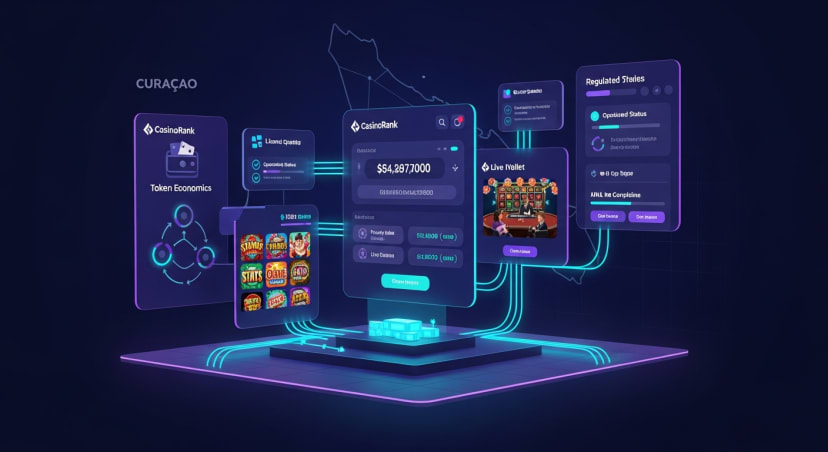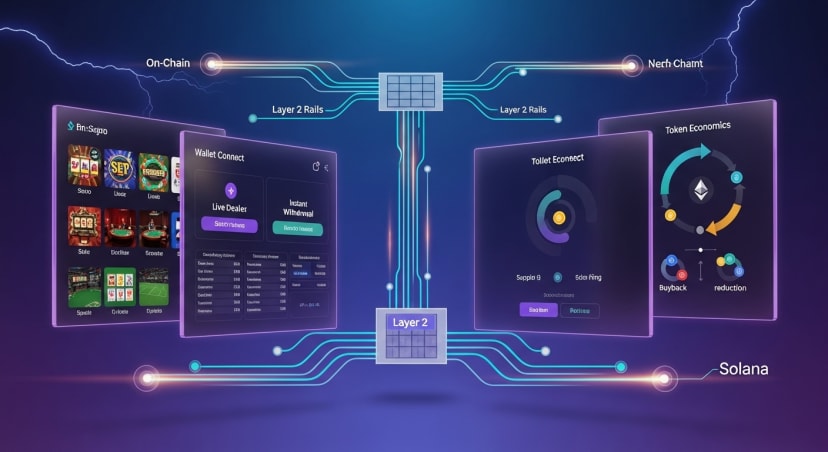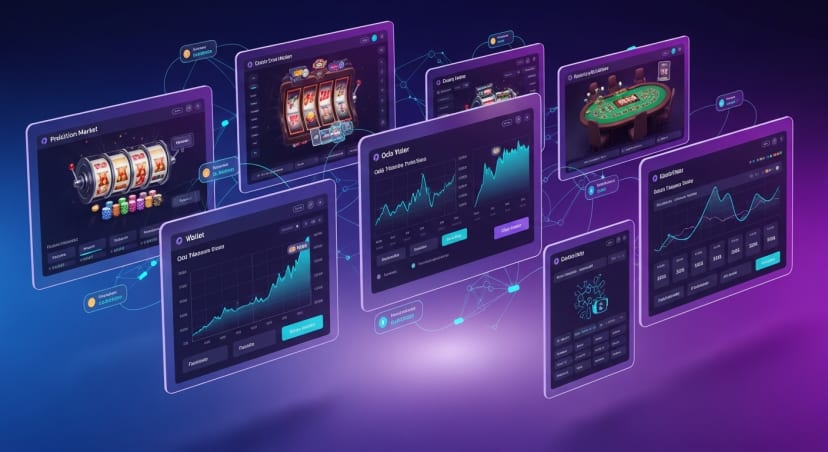Types of Crypto Gambling Regulation Models You Should Know About

The world of crypto gambling has changed a lot, bringing in new rules and ways of operating that affect how online casinos work. Understanding these models isn't just about following rules – it's about knowing how your money is safe and how these platforms actually run. Let's explore the different crypto gambling regulation models and figure out what they mean for players in the Philippines.
What Exactly Are Crypto Regulation Models?
Crypto regulation models are basically the rulebooks that guide how cryptocurrency gambling sites operate, handle player funds, and stay compliant with gambling laws. These models mix old-school gambling rules with new blockchain tech, leading to unique ways to protect players and keep things transparent. Think of them as the instruction manuals for crypto casinos, covering everything from deposits and withdrawals to making sure games are fair.
Key Types of Crypto Casino Models to Know
DeFi (Decentralized Finance) Casino Model
This is a cutting-edge model that uses smart contracts on blockchain networks, cutting out the need for traditional middlemen. DeFi casinos automate payouts directly through these smart contracts, minimizing manual work. The odds and game rules are fully transparent and verifiable on the blockchain. Transactions happen directly between players, boosting both privacy and speed. Plus, they usually have much lower operating costs, which can mean better potential returns for players like you in the Philippines.
DAO (Decentralized Autonomous Organization) Casino Model
DAO casinos take a community-first approach, where anyone holding tokens gets a say in how the platform is run. Decisions are made through voting, giving power to the community. All financial matters are completely transparent, and profits are often shared among members. This collective setup also means risks are managed by the community as a whole, addressing any issues or new ideas together.
Hybrid Regulated Model
The hybrid model is a balanced approach, combining traditional casino structures with different types of cryptocurrency features. These casinos typically operate with standard gambling licenses from recognized regulatory bodies. They adhere to both crypto-specific rules and traditional financial regulations for fiat currencies. This model often includes robust player protection measures, similar to those in established online casinos, while still benefiting from the transparency of blockchain technology. Regular audits and oversight by regulatory authorities help maintain trust and ensure legitimacy.
Comparing Different Regulatory Models for Filipino Players
| Model Type | Player Control | Transparency | Regulation Level | Risk Level |
|---|---|---|---|---|
| DeFi | High | Very High | Low | Medium-High |
| DAO | Very High | High | Medium | Medium |
| Hybrid | Low | Medium | High | Low |
| Traditional | Very Low | Medium | Very High | Low |
| Offshore | Low | Low | Very Low | Very High |
How These Models Affect Crypto Casinos in the Philippines
The regulatory model a crypto casino chooses significantly impacts its operations, legal standing, and how it interacts with players. Here's a breakdown of the key effects:
Operational Impact
- DeFi Casinos Decentralized Finance (DeFi) casinos operate through smart contracts and blockchain protocols, enabling low-overhead structures with minimal human oversight. However, they often face substantial hurdles when attempting to comply with international regulatory frameworks due to their permissionless and anonymous nature. This lack of a central authority complicates issues like jurisdictional licensing and dispute resolution.
- DAO Models Decentralized Autonomous Organizations (DAOs) involve community governance, where token holders or stakeholders make key decisions via voting mechanisms. While this promotes democratic decision-making and deepens player engagement, it also demands constant community coordination, governance maintenance, and technical support to prevent voter apathy, manipulation, or stagnation in development.
- Hybrid Models Hybrid casinos blend decentralized crypto features with centralized oversight. For example, a platform may offer provably fair games using smart contracts but still require a traditional license and customer service team. This model seeks to balance innovation and user flexibility with the security and trust of regulatory compliance, though it also inherits the complexity of managing both paradigms.
- Traditional Models These are fully licensed casinos that incorporate cryptocurrency as a payment method without decentralizing core operations. They benefit from legal clarity, institutional backing, and established infrastructures, but often restrict blockchain features (like anonymous gambling or decentralized fund management) to remain compliant with strict gambling laws.
Compliance Requirements
- KYC/AML Protocols All models must grapple with Know Your Customer (KYC) and Anti-Money Laundering (AML) policies, but the approach varies significantly. Centralized and hybrid models typically have built-in onboarding processes for ID verification, while DeFi and DAO platforms may use zero-knowledge proofs, decentralized identity systems, or opt for limited access in regulated regions.
- Smart Contract Audits For platforms relying on autonomous code—particularly DeFi and DAO models—smart contract audits become essential. Regular third-party audits ensure the code is secure, bug-free, and compliant with legal frameworks, protecting both the platform and its users from vulnerabilities and potential exploits.
- Dual Licensing for Hybrids Hybrid models must juggle cryptocurrency regulations and traditional gambling laws. This means maintaining compliance with digital asset regulators (such as the SEC or MiCA) while also adhering to gaming authority rules (e.g., Malta Gaming Authority or UKGC), requiring more comprehensive legal infrastructure and cross-jurisdictional oversight.
- Ongoing Legal Adaptation Regulations in both crypto and gambling spaces evolve rapidly. Every model must stay current with changes, from introducing new KYC thresholds to complying with emerging international crypto tax laws. This demands proactive legal teams or advisors for continuous compliance updates.
Player Protection
- Fund Security DeFi platforms often use non-custodial wallets and smart contracts, putting the onus of fund safety on users. While this reduces risk of centralized theft, it increases vulnerability to contract bugs. Centralized and hybrid models may offer insured wallets and recovery protocols but require user trust in custodial management.
- Transparency Mechanisms DeFi and DAO casinos generally offer on-chain transparency—users can verify and explore crypto casino games logic, transaction histories, and payouts. Traditional models might rely on third-party audits and certificates, while hybrids aim to combine both, offering blockchain-based transparency for games but handling payments through licensed fiat services.
- Dispute Resolution In DAO or DeFi environments, dispute resolution may be handled by community voting or smart contract logic, which can be inflexible. Traditional models rely on customer support and regulatory bodies, providing clearer legal recourse. Hybrid systems may use mediation tools or third-party arbitration integrated with blockchain records.
- Player Rights and Responsibilities In centralized casinos, user agreements and terms of service dictate rights and liabilities. In contrast, DAOs may encode player rights into governance documents or smart contracts. DeFi platforms often place full responsibility on users, which can be risky for those unfamiliar with crypto mechanics. Hybrid models typically offer a blend, with platform-side policies and transparent, user-controlled elements.
Main Facts for Crypto Casino Players
Essential Knowledge Points:
- ✅ Always verify if the casino's smart contracts are audited
- ✅ Check the reputation of the auditing firm
- ✅ Understand the automated processes
- ✅ Verify the casino's licensing status
- ✅ Understand which jurisdictions recognize the platform
- ✅ Know your rights under different regulatory frameworks
- ✅ Understand how your deposits are stored
- ✅ Know the withdrawal process and timeframes
- ✅ Verify the platform's security measures
- ✅ Check governance rights (especially for DAO models)
- ✅ Review community engagement levels
Conclusion
The rise of DeFi, DAO, and hybrid models marks a transformative era in crypto gambling. Each model brings distinct strengths—whether it’s the automation of DeFi, the community governance of DAOs, or the regulatory assurance of hybrid platforms. Understanding these differences is key to navigating the space wisely.
As the industry continues to develop, we can expect further innovation alongside stricter regulatory expectations. Staying informed about these evolving models and the legal landscape will help you make safer, more strategic choices. Ultimately, to choose a trusted crypto casino platform that matches your risk tolerance and values transparency and security will enhance your overall gambling experience in the crypto world.
FAQ
What's the difference between DeFi and DAO casino models in the Philippines?
DeFi casino models use smart contracts and automated systems to run games and transactions, which means less human involvement. DAO casinos, however, are all about community control. Token holders get to vote on how things are run, making it a more community-driven setup.
Are crypto gambling regulation models legally binding in the Philippines?
The legal status of crypto gambling is different everywhere. These models have their own rules, but they still need to follow Philippine gambling laws. Some places have specific crypto gambling laws, while others don't, or it's not really clear.
How can I tell if a crypto casino is following the rules?
Check if they have a license, look at their smart contracts (especially for DeFi casinos), see how they're governed (for DAOs), and check for audits. Good platforms will have clear info on their rules and how they work.
What security features should I look for in regulated crypto casinos in the Philippines?
Make sure they have provably fair games, secure wallets, regular audits, clear transaction records, and KYC/AML checks. They should also have plans for emergencies, like freezing contracts or getting funds back. These things help protect you from fraud and theft.
Can I help run a DAO casino as a regular player?
Yes, most DAO casinos let you vote on things if you own their tokens. The more tokens you have, the more say you get in decisions like updates or how money is spent.
How do regulations affect how fast I can withdraw money and how much can I take out?
DeFi casinos usually let you withdraw money almost instantly, with limits set by smart contracts. DAO casinos might have limits decided by the community. Regular casinos often take longer because of checks and banking rules, and they might have stricter limits.
What are the risks of using casinos with different regulations?
Each type has its own risks. DeFi casinos could have problems with their smart contracts. DAO casinos could be manipulated or have low voter turnout. Traditional casinos could face regulatory issues. All of them can be affected by market changes and technical problems.
Can I use several crypto casinos with different regulations?
Yes, you can use multiple platforms, but it's important to know the rules, security, and KYC requirements of each one. Keeping track of accounts across different platforms can also affect your taxes and responsibilities, so stay organized.








